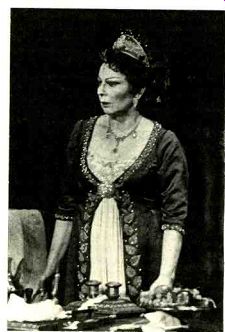
By WILLIAM LIVINGSTONE
VIVA DIVA!
At party this summer a friend, a music critic I respect, told me he had attended the last of three performances of Tosca sung at the Metropolitan Opera this year by the Italian soprano Magda Olivero. I listened with interest as he described her performance: "The high notes were all there, her intonation was accurate, and although she wisely saved herself a bit in Act I, she gave everything in Acts II and III. It was a very effective interpretation musically and dramatically, and I enjoyed it, but the audience was terrible!" "How so?" I asked. "Were they cold and unresponsive?" "Not at all," he said. "The house was filled with fans, applauding too much, shouting bravo, and terrorizing decent people into going along with them."
Critics are often irritated by what they consider to be excessive enthusiasm in audiences, so it's just as well my friend was not at Mme. Olivero's first Tosca on April 5, which was her Met debut. Since she is approaching the end of a long career, most of her fans had abandoned hope of ever seeing her on the Metropolitan stage. Consequently, there was great excitement in the air as they gathered in the lobby on the big night-some had flown in from as far away as Texas. A few seemed nervous. Would all go well for the beloved diva? Could La Magdissima still deliver? They needn't have worried. Mme. Olivero lived up to her reputation as an exceptionally powerful singing actress. She was greeted with a thunderous ovation when she entered, and she was applauded not just for the arias and duets, but for certain well-delivered lines.
She brought down the house in Act I with her reading of the line "Dio mi perdona. Egli vede ch'io piango!" ("God will forgive me. He sees that I am weeping.") The Met's executive stage manager, Osie Hawkins, is said to have exclaimed, "We haven't had applause on that line since Licia Albanese!" And so it went. Afterwards the curtain calls lasted for nearly half an hour. Magda had lighted a Roman candle in the tired old face of show business, and the fans were delirious.
Why would anyone object to such a love feast? When I try to analyze the psychology of opera-going, I come up with far more questions than answers, but I think I understand this one at least. It seems to me that an opera-goer is annoyed or embarrassed by a big demonstration at a performance if he has not been sufficiently moved to go along with it. The Dionysian behavior of fans is therefore objectionable to critics because most of them can not or will not surrender themselves to a performance. In a sense they are not members of the audience at all, because they do not go to the opera to be amused, entertained, or moved. They are present as paid observers or judges. and their reviews are usually more concerned with technical details than with emotional response.

Olivero's Tosca: "Quanto? ... II prezzo!"
Most critics do not applaud at all, and I sometimes wonder whether they feel excluded when the magic begins and currents of excitement arc back and forth across the foot lights. A lot of the critics I know tend to mis trust enthusiasm, but they will express much more of it privately than they are ever willing to put into print. God forbid that their colleagues might mistake them for mere fans.
Some opera-goers consider the opera house a temple of art and would prefer that there be no applause until the curtain has come down and the last note has died away. Others think of the opera house as a pleasant place to spend an evening out, but they also think of themselves as "decent people" who do not ever make public displays of emotion. Both groups look down on all that rowdy bravo-shouting as somewhat unseemly.
Bravo-shouting? These days fans are far too attentive to grammatical niceties to be satisfied with a mere "bravo." They shout "bra vo" for a man. "brava" for a woman. "brave" for women, and "bravi" for a group that is all male or mixed. When really ecstatic, they speak in tongues and shout such gibberish as "viva diva" and "brava diva," phrases never heard in Italy.
Why do the fans carry on so? There is a certain element of exhibitionism, to be sure, but I rather admire the kids who are responsible for the showers of confetti, the ones who save their lunch money for flowers to throw at the feet of a great singer. It adds to the splendor of the occasion and raises the level of excitement; we need that on a very primitive level. There is so little ceremony and ritual left in modern life that going a bit wild at the opera gives fans a way of letting off steam in a manner that is, if not socially accepted, at least tolerated. It's healthy. As Henry Ward Beecher said, "In things pertaining to enthusiasm, no man is sane who does not know how to he insane on proper occasions."
I also admire the passionate loyalty of fans. It's nice to see a retired diva who has given pleasure to millions, say Bidii Sayao or Zinka Milanov, applauded when she attends a performance. Albanese's fans, the self-styled Licia Screechers, will probably all buy the Met's new recording of her Butterfly, the broadcast performance of January 19, 1946, as preserved on air-check acetates. The sound is no great shakes, but it's a fine performance and one of the most beautifully packaged opera sets I've ever seen. The Met intended it as a gift for donors of $100 or more to their deficit fund, but for Albanese fans it's just an expensive way of acquiring Licia's Butterfly, which she never recorded commercially.
And many Callas fans will buy the large new book Maria Callus, The Art Behind the Legend, by Henry Wisneski (Doubleday). It's oddly organized and not very well written, and in addition to some lovely photographs it contains many bad ones. After George Jellinek's excellent Callas biography (196(1) and Callas (1974) by John Ardoin and Gerald Fitzgerald, this might seem a totally unnecessary book. Who could want those annals listing the cast of every performance La Divina ever gave? The fans, that's who. The book is an obvious labor of love, and who would deny Mr. Wisneski the pleasure of writing it or Callas fans the pleasure of poring over it? Not I. And no one is going to terrorize you into forking out $17.50 for it.
Nicaragua has just issued a series of stamps honoring such singers as Callas. Joan Sutherland, and Birgit Nilsson. I'm sure the Price fans and Tebaldi fans, bless their hearts, are staying up nights writing angry letters to the Nicaraguan postmaster general demanding to know why their idols were not included. (And will someone explain to me why Giuseppe di Stefano was left out?) If, like my critic friend, you find the cult of the diva ridiculous or annoying, I will remind you that opera doesn't work very well without stars, and a diva has got to have the support of her fans. The original meaning of the Italian word "diva" is goddess, and a goddess subsists on the faith of her worshipers.
---
also see: LETTERS to the EDITOR